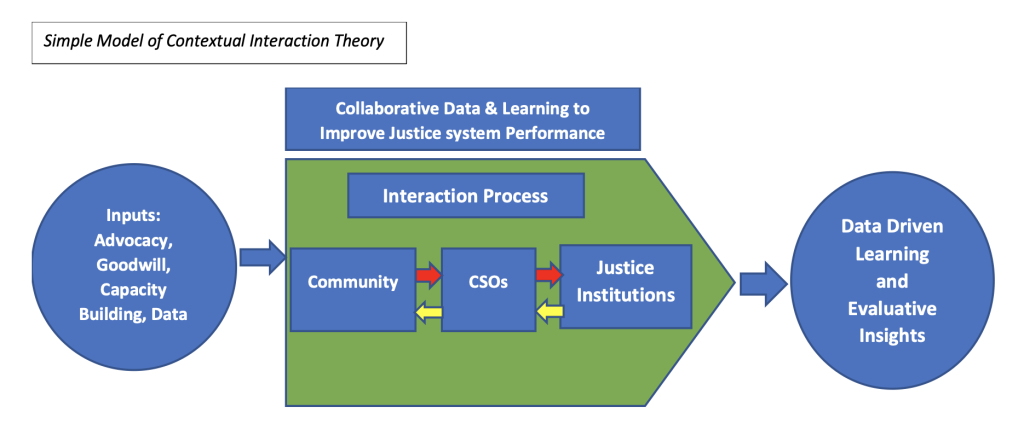Thank you for subscribing to aea365! AEA is aware of the issue impacting email receipt of aea365 blog posts. Our RSS Feed provider has announced a reduction in maintenance which has unfortunately resulted in sporadic email receipt of daily posts. AEA is transitioning to a new provider and intend to roll out a new, improved service in early September 2022! Until then, please continue to regularly check back to aea365 for daily tips, tricks, and resources for evaluators by evaluators. You may also add AEA365 blog’s feed URL – https://aea365.org/blog/feed/ – to your favorite RSS! Stay tuned for additional details! For questions, please contact AEA at info@eval.org.
Hello. My name is Jerim Obure. I am a Global Senior Specialist for Monitoring, Evaluation and Learning at International Justice Mission (IJM), a global CSO headquartered in Washington DC, working to strengthen justice systems around the globe for better protection of rights.
By many accounts, democracy, human rights, and governance are largely on the downward trend around the globe. This is not just a political pandemic in the global south, but also in the global west, which previously were considered beacons of good governance and rights. Flagrant violation of fundamental freedoms, manipulation of the constitution by political executives, and callous profaning of international human rights conventions have become the trend in many countries.
So what does this portend for evaluators in democracy, governance, and human rights today? Can democracy and rights interventions be effective given the macro trends against them? How should outcomes be evaluated when there is little hope for meaningful systemic change? Are we trapping ourselves in self-defeating undertakings? Will the traditional scientific evaluation approaches still hold that torch of promise? I have worked in many governance and human rights programs, where the culture of development target setting is a “forward-ever, backward-never romanticism.” As evaluators, we often come towards the end of the intervention to unveil what may already be a self-fulfilling prophecy.
In my estimation, we as evaluators in democracy, human rights, and governance are perhaps caught up in between the conspiracy of scientific rigor and the “forward ever” romantic optimism of development planning. So, do we need to shift our evaluation paradigms? Perhaps yes! We need to listen, learn, and explore. No doubt, such exploration is going on with the proliferation of “not too scientific” postmodern methods of evaluative enquiry.
Soft, quasi experimental and participatory approaches that promote collaborative evaluation and learning are worth exploring.
At IJM, one of our key programs is to foster interagency sharing of data and learning to promote system-wide data driven learning and adaptative management within justice systems. We have encountered several challenges such as resistance to transformative interventions (aka “we are independent government institutions, don’t interfere with our independence”), weak interagency coordination mechanisms, and reluctance to formal commitment. In working with such institutions, we have striven for political goodwill, dialogue and mindset of collaborative governance, bringing together community, CSOs, and Justice Institutions.
To wade through methodological concerns, we are using the Contextual Interaction Theory (CIT) to monitor and evaluate (or at least make sense of) the effectiveness of such collaborations to realize relevant justice outcomes. Katherine and Bressers posit that CIT revolves around motivation, information, and power.

We have implemented this project over the last two years. We have learnt great lessons as we transform from initial mistrust to negotiating new rules of engagement. We have started to see signs of trust, transparent sharing of data and joint sense making in quasi evaluative ways. Such is the novelty that may characterize shifting paradigms in monitoring and evaluating democracy, human rights and governance programs.
Hot Tips
- Evaluating change in governance and rights requires a collaborative approach, with a negotiated value system development.
- Transformative change in governance is a self-motivated process, characterized by mistrust, resistance, power and pride from those who manage instruments of governance. Building trust is a critical first step.
- The evaluator must have an open mind, willing to learn as you analyze change.
Rad Resources
- Contextual interaction theory as a conceptual lens on complex and dynamic implementation process by Hans Bressers
- Collaborative Governance Framework by the Tamarack Institute
The American Evaluation Association is hosting Democracy, Human Rights & Governance TIG Week with our colleagues in the Democracy, Human Rights & Governance Topical Interest Group. The contributions all this week to aea365 come from our DRG TIG members. Do you have questions, concerns, kudos, or content to extend this aea365 contribution? Please add them in the comments section for this post on the aea365 webpage so that we may enrich our community of practice. Would you like to submit an aea365 Tip? Please send a note of interest to aea365@eval.org. aea365 is sponsored by the American Evaluation Association and provides a Tip-a-Day by and for evaluators. The views and opinions expressed on the AEA365 blog are solely those of the original authors and other contributors. These views and opinions do not necessarily represent those of the American Evaluation Association, and/or any/all contributors to this site.
